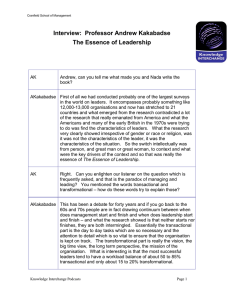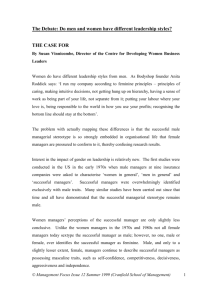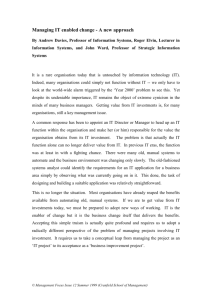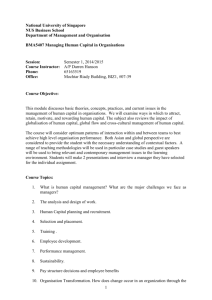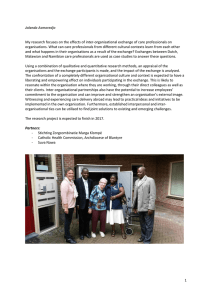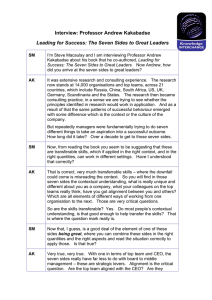Interview: Professor Andrew Kakabadse Extraordinary Performance from Ordinary People
advertisement
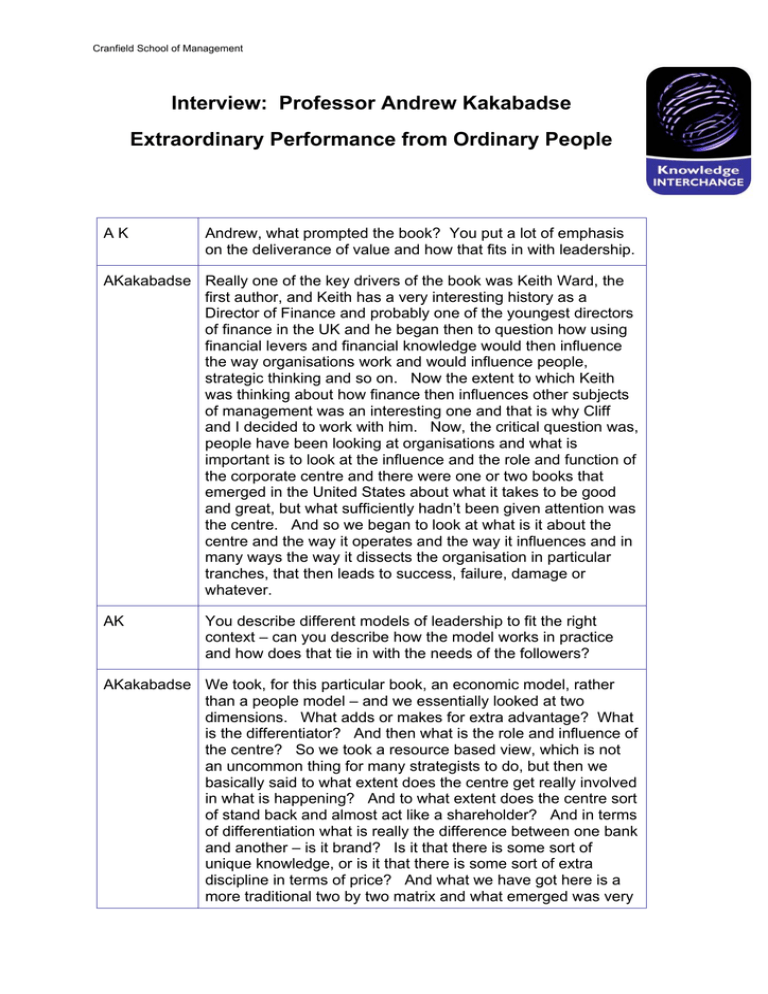
Cranfield School of Management Interview: Professor Andrew Kakabadse Extraordinary Performance from Ordinary People AK Andrew, what prompted the book? You put a lot of emphasis on the deliverance of value and how that fits in with leadership. AKakabadse Really one of the key drivers of the book was Keith Ward, the first author, and Keith has a very interesting history as a Director of Finance and probably one of the youngest directors of finance in the UK and he began then to question how using financial levers and financial knowledge would then influence the way organisations work and would influence people, strategic thinking and so on. Now the extent to which Keith was thinking about how finance then influences other subjects of management was an interesting one and that is why Cliff and I decided to work with him. Now, the critical question was, people have been looking at organisations and what is important is to look at the influence and the role and function of the corporate centre and there were one or two books that emerged in the United States about what it takes to be good and great, but what sufficiently hadn’t been given attention was the centre. And so we began to look at what is it about the centre and the way it operates and the way it influences and in many ways the way it dissects the organisation in particular tranches, that then leads to success, failure, damage or whatever. AK You describe different models of leadership to fit the right context – can you describe how the model works in practice and how does that tie in with the needs of the followers? AKakabadse We took, for this particular book, an economic model, rather than a people model – and we essentially looked at two dimensions. What adds or makes for extra advantage? What is the differentiator? And then what is the role and influence of the centre? So we took a resource based view, which is not an uncommon thing for many strategists to do, but then we basically said to what extent does the centre get really involved in what is happening? And to what extent does the centre sort of stand back and almost act like a shareholder? And in terms of differentiation what is really the difference between one bank and another – is it brand? Is it that there is some sort of unique knowledge, or is it that there is some sort of extra discipline in terms of price? And what we have got here is a more traditional two by two matrix and what emerged was very Cranfield School of Management Professor Andrew Kakabadse different practices at both organisation, teams, departments and people – and so by using this as the economic model to drive the organisation, and people having to live in particular contexts which may be more knowledge based, interesting, more to do with delegation and more to do with giving your opinion versus sitting in a box and driving costs and prices through to the extent that you want, that is what determined people’s behaviour and followership. So it was really economics that was driving followers' behaviour and followers' expectations. AK What are the implications for organisations and leaders, particularly what does it mean for developing leaders? AKakabadse From this particular perspective, of this book, it's do people see the same thing in the same way? What I have described is a fairly simplistic model – why are you different and what does top management really do about it? Now the problem is that you and I may not see why we are different, or you and I may see an entirely different view as to why we are different. So when we drew on early research, we were finding statistics like, of the world’s top teams, about 35% could not even agree on the vision and lived together for years undermining each other and about 67% could not even talk about those issues that were sensitive. So not only were they undermining each other, they were pretending at meetings as if that wasn’t happening and everybody knew what was happening and they were walking out of the meeting breaking the rules that they had just created in the meeting. So, one of the learning for leaders is why does your colleague hold a different view to you? And if we all have the same economic and financial data, why do we interpret it so differently? Well, one reason could be role. You could be the managing director of Germany and you see the German market and all its influences in a completely different way to the head of marketing, say, in Chicago. You could be a director of human resources and so you have an internal look of key functions and you are trying to get consistency across the organisation and yet the head of manufacturing for South East Asia just cannot understand some of the personnel policies and systems that you are trying to introduce which have a sort of North American or Anglo American flavour in basically an Asian country that has completely different issues around poverty and child labour. So depending on your role and position, you may interpret the same data in completely different ways. There is another piece of learning which is just ego. You and I may see exactly the same situation in the same way, but we are very competitive as people. And so what we do is we try and take positions in the top team or in board room discussions, or wherever, that will undermine each other. So one of the key Knowledge Interchange Podcasts Page 2 Cranfield School of Management Professor Andrew Kakabadse learnings is, if we share the same data, why do we see the world in a different way? And if we see the world in a different way, can we integrate those different perspectives? And if we can’t integrate those different perspectives, is it because there is something wrong with us as people or is it because the organisation has now reached such a size that genuinely parts of the organisation are in growth phase, and parts of the organisations are in decline – almost sell – phase, and so if you are sitting at the centre, trying to convince your managing directors or general managers across the world that what you are doing is right, it is going to be a very hard job because they have a completely different economic reality to live with day by day. So one of the learning points is how do we communicate such diversity and tension and still bring people on board and still have people think in a corporate way, as opposed to a more localised, divisionalised or subsidiary way? AK That is very interesting. The book came out at the end of last year, how have the ideas been received? AKakabadse Well I think one of the interesting aspects about being an author is that you have no idea what is happening in the market place. I tend to be contacted by the publishers, probably two years later, and told this is how much you have earned. And from that is the only way I can really deduce what is really happening. But from teaching and from consulting, the ideas go down very well. The most sensitive role, where the ideas have met with blockage, tend to have been the role of the chief executive. It's almost as if this person is committed to the way they have defined, or the way they have identified as the way forward, and then they see there is a such a logic and such a reason why some of their immediate subordinates may take different positions. And so what you have there, is a chief executive that could be easily threatened – a chief executive that can’t communicate, a chief executive that doesn’t know how to deal with tension. And so they have found some of the ideas behind the book alarming, and the reality is that they are not. What it is, is a personal inhibition that the individual has to overcome. Surprisingly, equally, the person that has been most receptive to the book has been the chairman and the chairman sits on the board and takes this complete overview and that chairman can really see the tensions on their own board, and the tensions in the management team. And they are looking for a model which helps explain why are these tensions not just people problems? So it's not just negatively on each individual’s part, there is actually a sound logic and if a whole number of people – and as you can see from the statistics I quoted – about two thirds of the world’s organisations are deeply divided and can’t Knowledge Interchange Podcasts Page 3 Cranfield School of Management Professor Andrew Kakabadse discuss their issues. It's not because people are dumb, it''s because there must be a good reason. So as far as we can see, chairmen seem to like it, chief executives somewhat baulk at it, but general managers who are trying to fight their chief executive, love it. AK That’s great. What direction is your current research taking you in? What are you investigating? AKakabadse We are taking, if you like, all this leadership stuff and strategy stuff one step further and we have just finished a survey of the world’s boards. So a book is being written at present called Leading the Board and that is a compilation of data from the US to Russia to Germany, to all over about what it takes to lead today’s world class boards and what are the characteristics of being a top class board member and being a top class chairman, and how do you bring the chief executive and the management team on board. So there are still some overlap lessons that I have described in our discussion, but there is something else, and that something else is to really be able to stand back and have that complete overview. Now we thought at first that was more a mental problem – very few people can have that overview. What we found on boards is that very few people have the time to have that overview. So, a disturbing statistic that emerged for the UK is that something like 85% of non executive directors do not quite know the organisation on whose board they sit. They don’t know what differentiates it, they don’t really know what its competitive advantage is and the best test for that is to go to a board meeting and ask each of the board members to write down – not talk to each other – write down what they think is the competitive advantage and differentiating factor for that organisation, collect those pieces of paper and read it out. Now, having two different points of view I think is normal. But when you start having five completely different points of view on a board of eight, we have a problem. So what we are finding is that many board directors are going to meetings not quite knowing what they are doing and unfortunately spending too much time on detail, and almost breaking the boundary between what is board work and what is management work, simply because the chairman hasn’t been able to stand back sufficiently and almost educate their board, together with the approval and commitment of the chief executive, on what really makes this board and the organisation different. Now we thought the Brits were bad – do you know the country where this is absolutely the worst? US. AK Even more than the UK? AKakabadse The Russians were better, the Germans were better. In fact Knowledge Interchange Podcasts Page 4 Cranfield School of Management Professor Andrew Kakabadse what we found in the US were boards so deeply inhibited we couldn’t believe it. What we found in the US were a few outstanding heroes, either as individuals or as companies. When you went below that level, you had something like 80 to 85% of American organisations were distinctly vulnerable and should, for example, Europe become one country and one market, under one government and one currency, and China really take off in the world, the Americans don’t stand a chance. The few outstanding American corporations do, but not the bulk of American companies. So, we are finding there that inhibition at board level without good chairmanship does cause harm. The problem is identifying that harm. AK So the implication of this is harder to define? AKakabadse It is harder to define, and why? There are only six to eight board meetings a year – twelve maximum. How long does each board meeting take? Three hours. We may have an away day per year. Then each of the non executive directors are external directors and go off and do something else – they may be managers of other companies, they could be non executive directors of six other organisations. So, their attention on this company and the decisions they make, and the longer term implications of those decisions take a long time to work their way through the organisation and even then, it is sometimes difficult to pinpoint that these decisions had this effect. But if you live with a place long enough, and if you exist with an individual organisation long enough, you can see the sort of knock-on effect of poor boardmanship and poor chairmanship. AK You mentioned Russia having a better percentage than the UK and the US – that is was it a kind of fresh start with the fall of the Berlin Wall transformation economy? AKakabadse Very much a fresh start, it’s a transformational economy. They have in a sense what the Americans had from about 1900 to 1920 – they have the owner-manager. In Russia they call them the Oligarch. So, these are young men and when you go to Russia today, in terms of business, you actually think you are in the 1920s – despite certain depressions, there is a lot of hope, there is this one guy driving this one organisation through. And they are like the great heroes – the great heroes of America that built the railway system or created the Ford car, with the same possible problems in the future. So the Americans have still not been able to sort of go away from the great man, great woman image of both strategy and leadership and in fact have created one failsafe mechanism after another to control this great person and often those failsafe mechanisms go wrong. So, at this point in time, Russia with Knowledge Interchange Podcasts Page 5 Cranfield School of Management Professor Andrew Kakabadse all its hopes for the future and its young individuals and bright young teams, living together for probably no more than a decade, you can see the motivation bubbling through. Let's see what they are like by 2020 and we will probably see much the same situation that we find in the US today. AK What about China and India? AKakabadse We are about to find out. We have got a whole series of studies and interviews lined up in May of this year to go to China. China is going to be a very different kettle of fish, largely because of who owns what. So with many companies the land on which your company is based and its buildings may be owned by the state, if not the buildings definitely the land. So we have an entirely different concept of ownership which offends the concept of ownership and business that we know in Europe, Africa, South America and North America. So it's almost as if many of these organisations are renting time from the state and so far that has not been a problem – but what about when the growth stops. What about when people begin to question a centralist party and want different viewpoints to be heard at government level, and represented at government level? Now that is already bubbling through in China – one of the biggest issues is not so much religion, it's poverty. We do have a massive divide in China just as much as you have in the US and as you have in Russia. So, add to this the different dimension of ownership of just simply the land, it will be interesting to see what happens to China by 2020. India really has a Western model and we can well see much of what we saw happening in the UK, happening in India. The big issue with India tends to be religious divides, but from a business perspective and a growth perspective, I think we will be seeing a sort of UK model, post World War II. AK Andrew, thank you very much indeed. Transcript prepared by Learning Services for the Knowledge Interchange www.cranfield.ac.uk/som Knowledge Interchange Podcasts Page 6 Cranfield School of Management Produced by the Learning Services Team Cranfield School of Management © Cranfield University 2007
